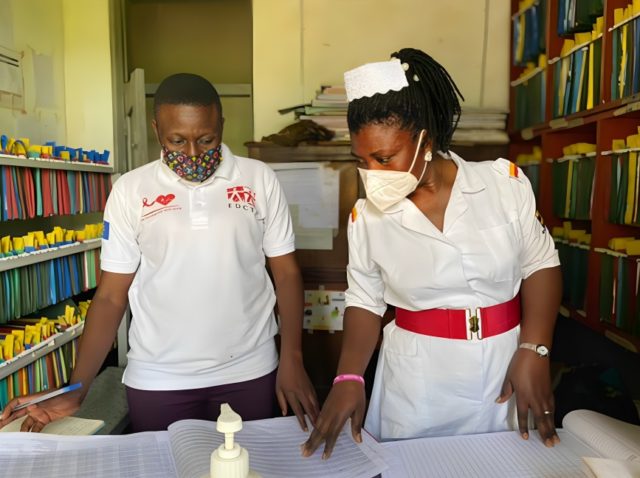The Infectious Diseases Research Collaboration (IDRC), in collaboration with the Uganda Ministry of Health (MOH), Uganda Heart Institute (UHI), London School of Hygiene and Tropical Medicine (LSHTM) and Makerere University, have achieved remarkable success through the Integrated HIV/HTN project. Funded by EDCTP, this project aimed to transform patient care by integrating hypertension care in to HIV care, shaping a new era in healthcare provision.
Elizabeth Arinitwe, UHI, recalls, “At the beginning of the project, the staff in the health facilities knew very few patients or none to have hypertension and HIV in the HIV care clinic.” However, with comprehensive training and mentorship on integrating hypertension care, healthcare providers experienced a paradigm shift in their approach. Armed with knowledge and equipped with digital blood pressure (BP) machines and batteries, they embarked on a mission to identify and provide holistic care to patients with both hypertension (HTN) and HIV.
Through their dedication and unwavering support, Elizabeth and the Integrated HIV/HTN team quickly witnessed significant outcomes. She explains, “Many patients have been identified to have hypertension who are receiving HIV care, some of whom it was severe with some complaints like constant headaches.” With timely interventions and the initiation of hypertension medication, these patients experienced a remarkable transformation. Their blood pressure began to slowly normalise, improving their quality of life.
Elizabeth emphasises, “With repeated mentorship sessions and support visits to the staff, they have gained knowledge and can quickly identify a patient with hypertension and manage the patient with both HTN and HIV.” This knowledge, acquired through continuous learning and guidance, resulted in an increased number of patients with hypertension being identified across all 26 intervention facilities.

One shining example is the Kibale HCIV in Kibale district, where the team has successfully identified over 150 patients in the HIV clinic with both HTN and HIV. Many of these patients presented with severe hypertension. However, thanks to the availability of hypertension treatment provided by the project, the vast majority achieved blood pressure control and experienced significant health improvements.
The Integrated HIV/HTN project has empowered healthcare providers to offer comprehensive care and brought hope and healing to countless individuals with HIV and hypertension. This collaboration’s perseverance and leadership have paved the way for a brighter future where integrated care becomes the norm, transforming patients’ lives and leaving a lasting impact on the healthcare landscape.
